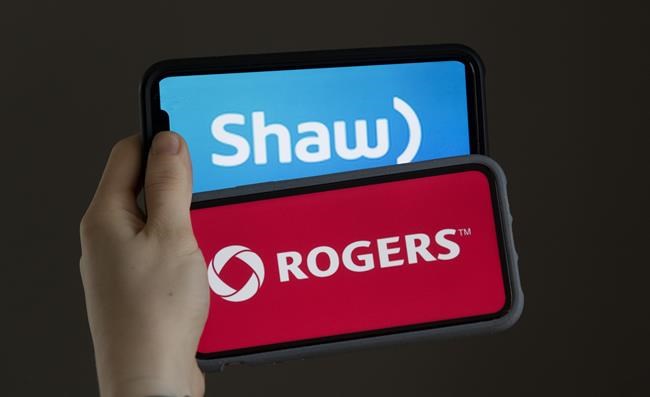Academics, smaller telecoms say Rogers shouldn’t be able to buy Freedom Mobile
Advertisement
Read this article for free:
or
Already have an account? Log in here »
To continue reading, please subscribe:
Monthly Digital Subscription
$1 per week for 24 weeks*
- Enjoy unlimited reading on winnipegfreepress.com
- Read the E-Edition, our digital replica newspaper
- Access News Break, our award-winning app
- Play interactive puzzles
*Billed as $4.00 plus GST every four weeks. After 24 weeks, price increases to the regular rate of $19.00 plus GST every four weeks. Offer available to new and qualified returning subscribers only. Cancel any time.
Monthly Digital Subscription
$4.75/week*
- Enjoy unlimited reading on winnipegfreepress.com
- Read the E-Edition, our digital replica newspaper
- Access News Break, our award-winning app
- Play interactive puzzles
*Billed as $19 plus GST every four weeks. Cancel any time.
To continue reading, please subscribe:
Add Free Press access to your Brandon Sun subscription for only an additional
$1 for the first 4 weeks*
*Your next subscription payment will increase by $1.00 and you will be charged $16.99 plus GST for four weeks. After four weeks, your payment will increase to $23.99 plus GST every four weeks.
Read unlimited articles for free today:
or
Already have an account? Log in here »
Hey there, time traveller!
This article was published 06/04/2021 (1646 days ago), so information in it may no longer be current.
TORONTO – Rogers Communications Inc. shouldn’t be allowed to buy Canada’s fourth-largest wireless service, Freedom Mobile, because it would undo attempts improve prices and services through competition, experts in telecommunications policy told MPs on Tuesday.
In a third day of hearings into the Rogers proposal to buy Shaw Communications Inc., which owns Freedom as well as Western Canada’s largest cable internet network, University of Ottawa law professor Michael Geist said regulators should require a spinoff of the wireless assets before approving the deal.
“While some seek to justify it or explain it away, the simple reality is that Canadians already pay some of the highest prices for wireless services in the world,” Geist said, echoing other opponents of the deal.

“If this merger is approved, the situation is likely to get worse. Indeed, when Rogers promises that it will not raise prices for Shaw Freedom Mobile customers for three years, it effectively signals that it will be raising them as soon as the clock runs out on that time.”
Shaw chief executive Brad Shaw and Rogers CEO Joe Natale told the same committee on March 29 that they’d be stronger competitors to Bell and Telus by combined their spending power and assets. That would allow an enlarged Rogers to reach more rural and underserved areas, they said.
Brad Shaw also said the company founded by his father J.R. Shaw just wasn’t big enough on its own to fund the enormous investments required to build fifth-generation wireless networks.
Under questioning from committee members, Geist — who holds the Canada Research Chair in internet and e-commerce law — said the “most palatable” outcome would be to have Shaw and Freedom remain independent rivals to Canada’s biggest three biggest telecommunications companies (Rogers, Bell and Telus).
“Shaw is a viable, innovative competitor,” Geist said. “So taking them out of the market … is a loss ultimately for consumers.”
Ben Klass, a member of a research team studying ownership concentration in Canada’s telecom and media industries, said the government needs to stick with aiming for a fourth wireless carrier in every region.
Most of the new wireless competitors that emerged in 2008 and 2009 have been absorbed by the Big Three. Shaw bought the largest independent provider, Wind Mobile, rebranding it as Freedom after the 2016 purchase.
“What we’re left with is Freedom (in Ontario, Alberta and B.C.) Videotron in Quebec, Eastlink in the Maritime provinces,” Klass said.
“If this merger is allowed, it would be tantamount to the government’s admission that they’re no longer interested in supporting real competition in this space.”
The deal announced March 15 needs regulatory approval to go forward. Key officials, including the federal competition commissioner, are scheduled to address the committee on Wednesday.
The Competition Bureau may not be able to block a deal because of an unusual feature of Canadian law, said Robin Shaban, an economist and co-founder of Vivic Research.
The Competition Act contains what’s commonly known as the “efficiencies defence” — that can be used to justify a merger if it creates a more efficient business, Shaban said.
“Rogers and Shaw claimed in their press release that the transaction will create $1 billion in synergies, or efficiencies, per year. If their claim is truthful, then the Bureau may be unable to take any action to protect competition in telecommunications markets,” Shaban said.
A representative of the Competitive Network Operators of Canada said the CRTC could be a more effective guardian of competition and consumer prices if it chooses to force the Big Three to share their internet or wireless networks at a reasonable wholesale price.
“The CRTC currently has the tools for it,” said Geoff White, CNOC’s director of legal and regulatory affairs.
“The CRTC regulates this industry and has clear policy direction,” White added. “It just needs the government to stand behind it when it does make a decision.”
On Wednesday, the industry, science and technology committee will hear from CRTC chairman Ian Scott, Competition Commissioner Matthew Boswell and officials from the Department of Industry.
This report by The Canadian Press was first published April 6, 2021.
Companies in this story: (TSX:RCI.B, TSX:SJR.B, TSX:QBR.B, TSX:BCE, TSX:T)

